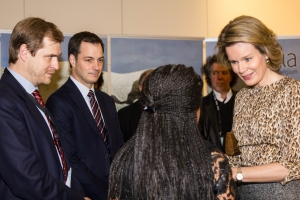Toespraak Europees Jaar voor Ontwikkeling
Toespraak Europees Jaar voor Ontwikkeling (Brussel) - 17 januari 2015
Votre Majesté,
Excellencies,
Dames en heren,
Bienvenue au lancement du volet belge de l’Année européenne pour le développement. Après l’inauguration officielle à Riga la semaine dernière sous le slogan “Notre monde, notre dignité, notre avenir”, c’est à présent à nous de donner ici à Bruxelles le coup d’envoi de l’Année européenne pour le développement.
Je tiens tout d’abord à souhaiter la bienvenue à Sa Majesté la reine Mathilde.
Majesté, je sais que vous vous intéressez et que vous vous engagez personnellement beaucoup dans le domaine de la coopération au développement. Votre présence en atteste une fois encore et souligne l’importance de cette année européenne pour le développement.
Je tiens également à accueillir chaleureusement les ministres de la Culture du Mali et du Cap Vert. Soyez les bienvenus ici à Bruxelles.
*
* *
Majesté,
Mesdames et Messieurs,
2015 est une année cruciale pour le programme de développement mondial, une année charnière.
En septembre prochain, 193 pays mettront au point, à New York lors du sommet spécial des Nations Unies sur le développement durable, un nouveau programme de développement décliné sur de nouveaux objectifs en matière de développement durable.
Dans son rapport de synthèse intitulé «La dignité pour tous d’ici 2030», le secrétaire général des Nations Unies Ban Ki-Moon évoque la nécessité d’un énorme déplacement de paradigme.
C’est en effet inévitable. Le monde est totalement différent d’il y a 15 à 20 ans. Les sept milliards de personnes qui peuplent la Terre n’ont encore jamais été aussi liées entre elles qu’aujourd’hui. Les populations et les pays n’ont jamais été aussi proches, reliés par notre économie mondialisée et par les possibilités immenses offertes par la science et la technologie.
2015 est aussi une année clé pour l’Union européenne et ses États membres, qui représentent le plus grand bailleur de fonds d’aide au développement dans le monde.
En tant qu’acteur mondial du développement, nous aussi devons donner forme à ce glissement de paradigme, tout en veillant à la légitimité démocratique, car toute politique – y compris de développement - qui n’est pas suffisamment soutenue, est vouée à l’échec.
À cet égard, il est encourageant de voir que plus de huit Européens sur dix considèrent l’aide au développement comme quelque chose d’important, selon l’Eurobaromètre. Je me réjouis tout particulièrement que les jeunes aient en général un regard plus positif à ce sujet.
Mais nous devons aussi oser reconnaître qu’à l’heure actuelle, un Européen sur deux n’a aucune idée de la manière dont est affectée l’aide au développement européenne.
Dès lors, l’Année européenne pour le développement est une occasion unique de mieux informer la population, de lancer des débats et de nourrir un dialogue, et par là même, de renforcer l’assise (sociétale) de la coopération au développement.
*
* *
Ladies and gentlemen,
This European Year for Development provides us with a unique opportunity to explore new horizons. We have to finally leave behind us the “cliché” of a poor South that is solely requesting aid and a rich North that is the unique holder of absolute truth.
The difference between North and South is becoming ever less relevant. During the past few years we have witnessed how a large number of developing countries have made an enormous “leap forward” in their development.
Still, while a large group of countries have made such clear and undeniable progress, a number of countries risk to be totally left behind. It are these least developed countries that during the coming years will constitute the first and foremost priority of Belgium’s development cooperation policy. This is the choice I have made and which I have elaborated a few weeks ago in my policy declaration for the Belgian Parliament.
Equally important is the approach to integrate Belgium’s development cooperation policy as much as possible in the European policy framework. Our focus on the least developed and fragile states is only one example of similar outlook and vision.
But Belgium wants to go even further than just policy coherence. We are pleading for a unified European development policy, in which the different member states find their own “niches” on the basis of what they are best at. It is my sincere desire that the European Year for Development will generate a catalyzing effect for a strengthened European cooperation. This can only benefit the impact of our development endeavors.
*
* *
Ladies and gentlemen,
As you probably know, in Belgium culture is a competence of the Communities and I do not want to interfere in the prerogatives of my colleagues in the Community governments.
Nevertheless, we cannot deny the fact that culture and development cooperation are two areas that are not only closely interlinked, but that also mutually influence each other.
Indeed, a development policy without sufficient “ownership” and local support, an approach that does not take the richness of cultural diversity into account, is right from the start doomed to fail.
All the more, cultural diversity and interculturalism constitute a cornerstone of development. Therefore, a development policy that is “fit for purpose” per definition needs to be sufficiently culturally blended.
However, while grasping the opportunities that culture offers, we also have to be cautious for a too strong emphasis on “cultural relativism”. The discussion on how universal human rights can exist in a culturally diversified world is one that continues to spark debates up until today.
Quite a few countries and regimes advocate that human rights need to be put in a “cultural perspective”. In other words: that the interpretation of the concept of human rights would be the prerogative of a specific culture or state.
Such an interpretation obviously fully contradicts international law and the international system of human rights.
Let us be clear on one thing: the principle that human rights are universal and are, so to speak, acquired by birth can in no way and by no means be hollowed.
States that invoke culture and traditional values and norms also often claim that human rights are ‘Western values’ that are being imposed on them.
Certain African countries argue that LGTB people do not exist on their continent and are just an invention by the West. Being LGTB would then, according to them, be in contradiction with the African culture.
Similarly, certain conservative countries, including European ones, invoke cultural and religious traditions to, for example, downgrade women’s rights. We can think here of sexual and reproductive rights, inheritance rights, equal access to education and work for women. These are all rights that are being contested and violated by the false use of religion or culture as a pretext.
I would like to remind you that these countries in almost all cases have signed and ratified the main human rights instruments. In other words: they have engaged themselves to these instruments.
It is also the task of development cooperation to provide support to effectively put these instruments into practice. Because the existence of certain traditions does not necessarily imply that these would be of a higher value than human rights. Quite to the contrary.
Until not so long ago, also in Europe and Belgium certain traditions and cultural habits were all but easy to match. We can think of women’s rights and labor rights. It took us generations to formulate and safeguard these rights. And we still have to defend these achievements on a daily basis, as we have witnessed again last week with the horrendous attacks on the freedom of the press in Paris and only two days ago with the prevention of major terrorist attacks in Belgium.
It thus comes as no surprise that a rights based approach will constitute one of two major axes in the Belgian development cooperation policy for the years to come.
As I remain convinced that a policy of development cooperation which is not firmly embedded in a framework of universal, indivisible and inalienable human rights is doomed to fail.
*
* *
Dames en heren,
Vooraleer ik besluit, zal het u niet verbazen dat ik als econoom en handelsingenieur kort stilsta bij de economische dimensie van cultuur.
In tal van ontwikkelde landen wordt cultuur beschouwd als een performante economische sector, die jobs biedt aan jongeren en een capaciteit van technologische innovatie in zich draagt.
Maar cultuur is veel meer dan dat. Cultuur herbergt een vorm van sociaal bestaan en een mogelijkheid tot expressie. Cultuur is ook een socio-culturele vector – een overbrenger van mondelinge en wetenschappelijke kennis die bijdraagt aan de sociale cohesie.
Cultuur is dan ook geen miskend thema voor de Belgische Ontwikkelingssamenwerking. Zo ondersteunen we culturele samenwerkingsprogramma’s met 7 Afrikaanse landen langs het netwerk van Africalia, dat dit panel organiseert. We komen ook tussen in sociale en culturele hulp aan bursalen van lage inkomenslanden en cultuur krijgt ook in onze samenwerkingsprogramma’s een plaats.
Ik denk bijvoorbeeld aan het nieuwe programma met Bolivië dat vorig jaar werd onderhandeld en dat aandacht geeft aan de culturele valorisatie van onderzeese archeologische opgravingen in het Titicacameer.
Kortom, het komt er op aan om ook de culturele dimensie op alle relevante niveaus van de Ontwikkelingssamenwerking te integreren. Want cultuur ligt mede aan de basis van duurzame ontwikkeling.
Of zoals de voormalige Senegalese president Léopold Sédar Senghor – die ook dichter was – het ons leerde: « Cultuur staat aan het begin en het eind van ontwikkeling”.
Vandaar ook dat de titel van dit debat, «Cultuur, pijler van de Ontwikkelingssamenwerking », meer dan ooit pertinent is.
Ik wens u dan ook een inspirerend debat toe, maar vooral ook een boeiend Europees Jaar voor Ontwikkeling.
Laat ons samen de kans grijpen om het draagvlak voor duurzame ontwikkeling het volgende jaar blijvend te versterken.
Ik dank U.


